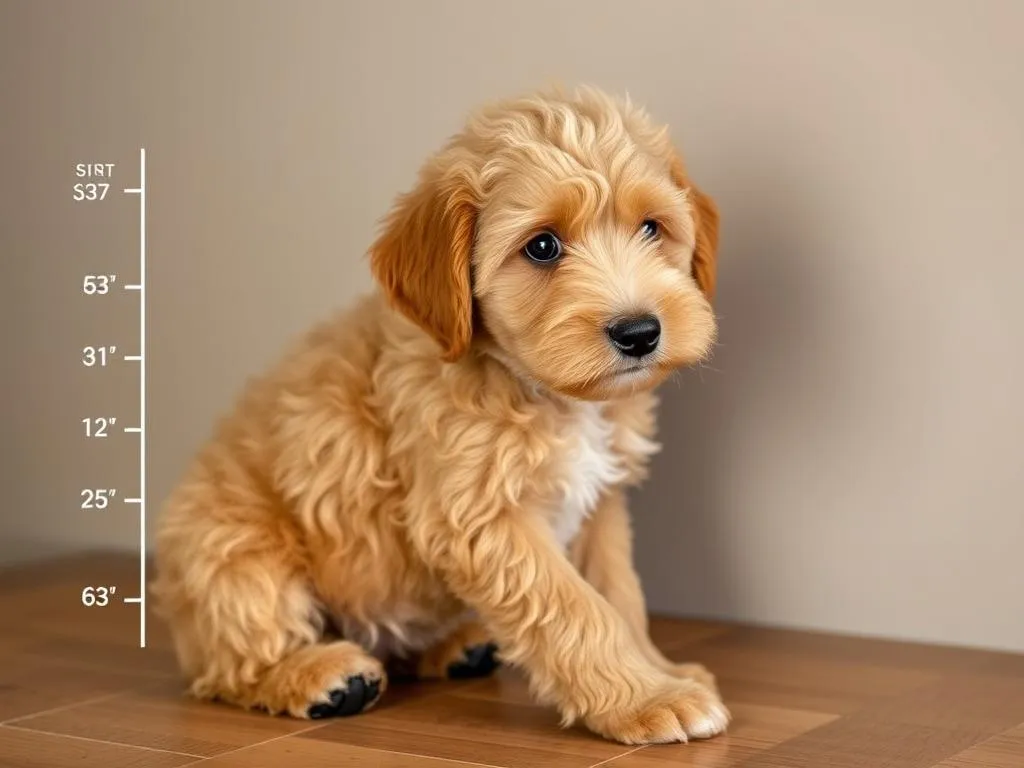
Introduction
Health care is a crucial aspect of ensuring that our furry companions live long, healthy lives. This is especially true for mini Goldendoodles, a popular hybrid breed known for their affectionate nature and intelligence. Characterized by their playful demeanor and distinctive coats, mini Goldendoodles make excellent family pets. Understanding their growth patterns and health care needs is vital for all dog owners.
In this article, we will delve into a comprehensive mini Goldendoodle size growth chart, covering everything from their growth stages to essential health care tips. Whether you’re a new owner or looking to improve your care routine, this guide will provide valuable insights into maintaining your mini Goldendoodle’s health and happiness.
Understanding Mini Goldendoodles
Breed Background
The Goldendoodle breed emerged in the late 20th century, combining the intelligence of the Poodle with the friendly disposition of the Golden Retriever. Mini Goldendoodles are a smaller variety, typically bred from a miniature Poodle and a Golden Retriever, resulting in a charming companion that retains the best traits of both breeds.
These dogs are known for their soft, curly coats, which can vary in color and texture. In addition to their appealing looks, they are celebrated for their friendly and sociable temperament, making them suitable for families, singles, and seniors alike.
Importance of Health Care
Like all breeds, mini Goldendoodles can be prone to specific health issues. Some common concerns include hip dysplasia, allergies, and certain eye conditions. Regular veterinary check-ups and vaccinations play an essential role in early detection and prevention of these health problems. By maintaining a proactive health care routine, owners can help ensure their mini Goldendoodles lead healthy, happy lives.
Size Growth Chart for Mini Goldendoodles
Growth Stages
Understanding the growth stages of a mini Goldendoodle is crucial for tracking their development. These stages can be divided into three main phases:
- Puppy Stage (0-6 months): Rapid growth occurs during this phase, where diet and nutrition are critical.
- Adolescent Stage (6-12 months): Growth begins to slow down, and training and socialization are essential.
- Adult Stage (1 year and older): At this point, the dog has reached its full size, but continued health care is vital.
Size Growth Chart
Below is a detailed size growth chart for mini Goldendoodles, showcasing average height and weight at different ages:
| Age (Months) | Height (Inches) | Weight (Pounds) |
|---|---|---|
| 0-2 | 5-7 | 2-4 |
| 3 | 7-9 | 4-6 |
| 4 | 9-11 | 6-9 |
| 5 | 10-12 | 9-12 |
| 6 | 11-13 | 12-15 |
| 7 | 11-14 | 14-18 |
| 8 | 12-15 | 16-20 |
| 9-12 | 12-16 | 18-25 |
| 12+ | 12-17 | 20-35 |
This chart serves as a guideline; individual dogs may vary based on genetics, nutrition, and overall care.
Factors Influencing Growth
Several factors influence the growth of mini Goldendoodles:
-
Genetics: The lineage of your mini Goldendoodle plays a significant role in determining their size. Responsible breeders provide insights into the size of the parents, which can give clues about potential growth.
-
Diet: Proper nutrition is critical for healthy growth. High-quality dog food formulated for small breeds will help ensure that your puppy receives the necessary nutrients.
-
Exercise: Regular physical activity is essential for overall health and proper growth. It helps maintain a healthy weight and supports muscle development.
Health Care Essentials for Mini Goldendoodles
Nutrition and Diet
A balanced diet is fundamental to the health of your mini Goldendoodle. The nutritional needs change as they grow:
-
Puppy Stage: Puppies require a diet rich in protein and fat to support their rapid growth. Look for high-quality puppy food that meets AAFCO standards.
-
Adolescent Stage: As they transition into adolescence, their caloric needs may decrease slightly. Continue to offer balanced meals, keeping an eye on their weight.
-
Adult Stage: Adult mini Goldendoodles should be fed high-quality adult dog food formulated for small breeds. This helps maintain a healthy weight and provides the necessary nutrients for their lifestyle.
Regular Vet Visits
Regular veterinary visits are crucial for your mini Goldendoodle’s health. A typical schedule might include:
- Puppy Visits: Start early with vaccinations and health checks, typically around 6-8 weeks old.
- Annual Check-Ups: After their first year, annual check-ups help monitor health, update vaccinations, and catch potential issues early.
Preventative care is essential to maintaining a healthy dog. Discuss with your vet about parasite prevention and dental care, as these are also crucial components of overall health.
Common Health Issues
Mini Goldendoodles can face specific health challenges. Some common issues include:
-
Hip Dysplasia: A genetic condition where the hip joint doesn’t fit into the hip socket properly. Regular vet check-ups can help monitor and manage this condition.
-
Allergies: These dogs can suffer from food or environmental allergies. Symptoms may include itching, excessive licking, or gastrointestinal issues. Consult your vet for appropriate testing and treatment options.
-
Eye Conditions: Conditions like cataracts and progressive retinal atrophy can affect mini Goldendoodles. Regular eye exams can help catch these issues before they become severe.
Being aware of these potential health issues can help you take proactive steps in your dog’s care.
Grooming and Maintenance
Coat Care
Mini Goldendoodles have a beautiful coat that requires regular grooming to keep it healthy and free from matting.
-
Frequency: Regular brushing (at least 2-3 times a week) is essential to prevent tangles and mats.
-
Tools: Invest in quality grooming tools, including a slicker brush, comb, and clippers. This will make the grooming process more manageable and enjoyable for both you and your dog.
Dental Health
Maintaining your mini Goldendoodle’s dental health is just as important as caring for their coat. Dental disease can lead to other health issues, so:
-
Brushing: Aim to brush your dog’s teeth at least 2-3 times a week, using toothpaste formulated for dogs.
-
Chews and Toys: Provide dental chews and toys that can help reduce plaque and tartar buildup.
Exercise and Mental Stimulation
Mini Goldendoodles are active and intelligent dogs that require regular exercise and mental stimulation.
-
Exercise Routines: Aim for at least 30-60 minutes of exercise each day. This can include walks, playtime in the yard, or trips to the dog park.
-
Mental Stimulation: Incorporate puzzle toys, training sessions, and interactive games to keep your mini Goldendoodle mentally engaged. This helps prevent boredom, which can lead to destructive behavior.
Training and Socialization
Basic Training
Training is essential for all dogs, and mini Goldendoodles are no exception.
-
Consistency: Use consistent commands and routines to help your dog understand expectations.
-
Positive Reinforcement: Reward-based training is effective. Use treats, praise, and playtime to encourage good behavior.
Socialization Techniques
Socializing your mini Goldendoodle is crucial for developing a well-adjusted dog.
-
Exposure: Introduce your puppy to a variety of environments, people, and other pets to help them become comfortable in different situations.
-
Playdates: Arrange playdates with other dogs to promote healthy interactions and help them learn appropriate social behavior.
Conclusion
Taking care of your mini Goldendoodle involves understanding their growth patterns and maintaining a proactive health care routine. By following a mini Goldendoodle size growth chart, you can monitor your dog’s development and ensure they are on track. Consistent veterinary care, a balanced diet, regular grooming, and proper training will help your furry friend thrive.
As responsible dog owners, it is our duty to be proactive about our pets’ health and well-being. By staying informed and engaged in their care, we can provide mini Goldendoodles with the happy, healthy lives they deserve.









